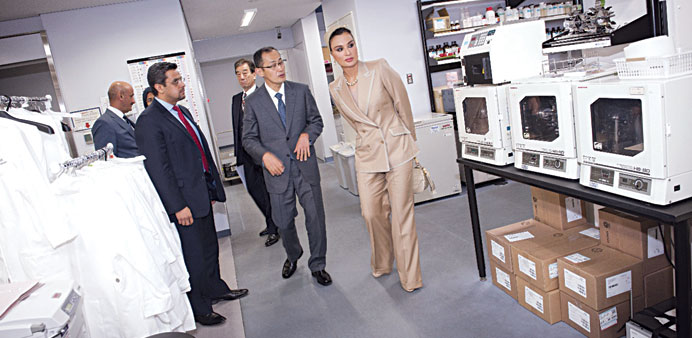| HH Sheikha Moza visiting the Centre for induced pluripotent stem (iPS) Cell Research and Application (CiRA) at Kyoto University in Japan with CiRA director and Nobel Prize winner Dr Shinya Yamanaka. PICTURE: Maher Attar / HHOPL |
HH Sheikha Moza bint Nasser, the chairperson of Qatar Foundation for Education, Science and Community Development (QF), yesterday visited the Centre for induced pluripotent stem (iPS) Cell Research and Application (CiRA) at Kyoto University in Japan.
During the visit, she met Dr Shinya Yamanaka, director of CiRA and professor at Kyoto University. Dr Yamanaka is also a 2012 Nobel Prize winner in Physiology or Medicine.
Sheikha Moza was given an overview of CiRA by Dr Yamanaka. She also listened to a talk on cell therapy for spinal cord injury, and held a discussion on research collaboration and exchange of expertise between Qatar Foundation R&D and CiRA. The visit concluded with a lab tour.
Speaking of the synergies between the institutes, Sheikha Moza said, “Innovation is key to all that we do at Qatar Foundation. Last year, we launched the World Innovation Summit for Health, known as WISH, which is a global initiative aiming to promote innovation in the delivery of healthcare around the world. It was there that we announced the ‘Qatar Genome’ project, which is a roadmap for our journey towards personalised medicine.”
Sheikha Moza was accompanied during the visit by Faisal Alsuwaidi, president of QF Research and Development (R&D), and a delegation from the Qatar Biomedical Research Institute (QBRI), headed by the executive director Dr Hilal Lashuel.
QBRI was established to conduct research to tackle diseases such as cancer, diabetes and cardiovascular disease through advancements in platform technologies such as stem cells and genomics, with the aim of translating the research outcomes into clinical practice.
CiRA was established in 2010 in order to further advance iPS cell research. Through collaborations with researchers in Japan and abroad, CiRA has advanced technological development aimed at drug discovery and regenerative medicine (cell transplantation therapy).
Also yesterday, Sheikha Moza was welcomed by the Governor of Kyoto Mr Keiji Yamada, to the Kyoto State Guest House in Japan.
Sheikha Moza thanked the governor, saying that the friendship between Qatar and Japan is “based on mutual respect and trust.”
She added, “Our partnership can be symbolised by the Qatari-Japanese Friendship Fund. The Fund was established by His Highness the Father Emir, Sheikh Hamad bin Khalifa al-Thani in the wake of the March 2011 devastating earthquake and tsunami as an expression of our deep empathy.
“Today, Qatar is pleased that this Fund has supported thousands of victims across the most affected areas through a range of sustainable projects in education, healthcare and fisheries. We hope that its impact will continue to help many more in their journeys to recovery,” Sheikha Moza said.
She went on to describe her objectives for the ongoing QF visit: “I am confident that the discussions the Qatar Foundation has held this week with Japanese institutes will launch the next phase in our relationship. A phase that will result in collaborations in a wide range of innovative research and technology fields that will be of tremendous benefit to both our countries.”
While at the Kyoto State Guest House, Sheikha Moza witnessed a Japanese tea ceremony, which involves the ceremonial preparation and presentation of a powdered green tea. The ceremony is meant to show respect through grace and etiquette.
Following the tea ceremony, Sheikha Moza watched ‘Noh’ - a style of classical Japanese musical drama that dates back to the 13th century.
The Kyoto State Guest House was built to welcome guests from other countries and help them better understand the culture of Japan, and to deepen friendship.
HH Sheikha Moza is introduced to a traditional Japanese tea ceremony at the Kyoto State Guest House. PICTURE: Maher Attar / HHOPL
HH Sheikha Moza bint Nasser visits a laboratory at the Centre for induced pluripotent stem (iPS) Cell Research and Application (CiRA) at Kyoto University in Japan. PICTURE: Maher Attar / HHOPL

